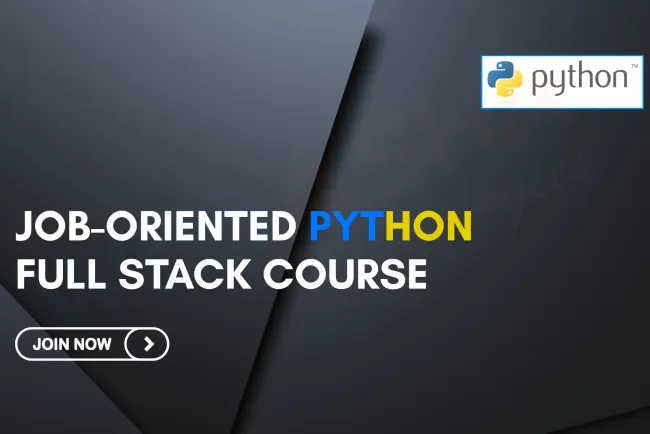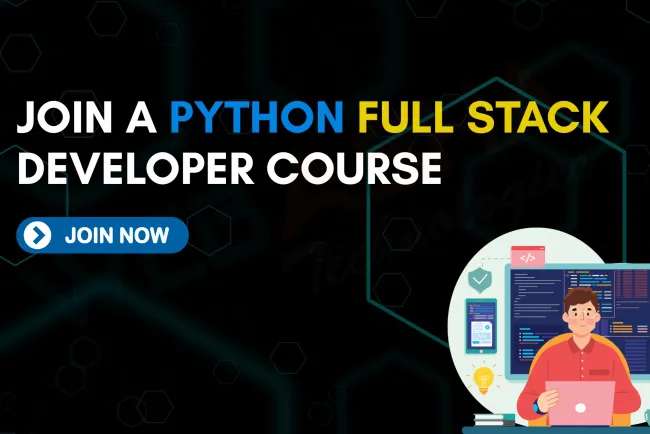Python Full Stack Developer Course Online | Learn Web Development from Scratch
Join the top-rated Python Full Stack Developer Course Online and master front-end, back-end, and database integration. Learn Python, Django, JavaScript, and build real-world web apps from anywhere.

Table of Contents
- Why Choose Python for Full Stack Development?
- What Does a Python Full Stack Developer Course Online Include?
- Benefits of Taking Python Full Stack Developer Course Online
- Skills You’ll Gain in an Online Python Full Stack Developer Course
- Ideal Audience for Python Full Stack Online Course
- How Long Does It Take to Become a Python Full Stack Developer Online?
- Career Opportunities After Completing the Course
- Python Full Stack Developer Salary Trends in India (2025)
- Online vs Offline Python Full Stack Courses: Which Is Better?
- Top Tools and Technologies You’ll Learn
- Why Take a Python Full Stack Developer Course Now?
- Conclusion
- Frequently Asked Questions (FAQs)
In today’s fast-paced tech world, the demand for full stack developers continues to rise—especially those who are proficient in Python. Whether you're a student, working professional, or a career changer, a Python Full Stack Developer Course Online can unlock a lucrative and flexible career path. With the rise of remote learning, online courses now offer the same hands-on experience, industry-level projects, and certification opportunities as traditional in-person classes.
This blog explores what makes Python ideal for full stack development, what a full stack curriculum includes, and how an online course can prepare you for a job-ready career in web development.
Why Choose Python for Full Stack Development?
Python is one of the most beginner-friendly yet powerful programming languages. Its simplicity, robust frameworks like Django and Flask, and strong community support make it an ideal choice for full stack development.
Key reasons Python stands out:
-
Easy to learn and write
-
Highly scalable for startups and enterprise apps
-
Rich ecosystem of libraries and frameworks
-
Perfect for back-end, scripting, automation, and data integration
What Does a Python Full Stack Developer Course Online Include?
A comprehensive online full stack course covers both front-end and back-end technologies. The goal is to help you build complete web applications from scratch and understand how all components work together.
Key Topics Covered:
Front-End Development
-
HTML5, CSS3, JavaScript, Bootstrap
-
DOM manipulation, responsive design, AJAX
-
Front-end frameworks like React (optional)
Back-End Development
-
Python core programming
-
Django and Flask frameworks
-
API development using Django REST Framework (DRF)
Database Integration
-
MySQL, PostgreSQL
-
MongoDB (NoSQL database)
-
ORM (Object Relational Mapping) with Django
Version Control & Deployment
-
Git and GitHub
-
CI/CD basics
-
Deployment on Heroku, AWS, or Docker containers
Capstone Projects & Portfolio Building
Benefits of Taking Python Full Stack Developer Course Online
Online training offers flexibility, affordability, and accessibility without compromising quality.
Top Benefits:
-
Learn at your own pace from anywhere
-
Access to recorded sessions and resources
-
Real-world project experience
-
Live mentor support and doubt-clearing sessions
-
Resume-building and placement assistance
Skills You’ll Gain in an Online Python Full Stack Developer Course
By the end of your Python Full Stack Developer Course Online, you’ll be proficient in:
-
Creating dynamic web pages using JavaScript and AJAX
-
Building secure, scalable back-end applications with Django or Flask
-
Designing RESTful APIs and connecting them to front-end interfaces
-
Working with databases and managing data flow
-
Deploying your projects live on the internet
Ideal Audience for Python Full Stack Online Course
This course is ideal for:
-
Beginners with no prior programming experience
-
Students or graduates seeking tech careers
-
Professionals from other domains planning a switch to development
-
Freelancers building full-fledged web applications
-
Entrepreneurs developing MVPs or startup apps
How Long Does It Take to Become a Python Full Stack Developer Online?
Typically, an online Python full stack course takes 4–6 months depending on the learning mode (self-paced vs live classes) and your availability. Accelerated bootcamps may finish in 2–3 months with daily intensive training.
Career Opportunities After Completing the Course
After completing a Python Full Stack Developer Course Online, you can apply for:
-
Full Stack Web Developer
-
Backend Python Developer
-
Web Application Developer
-
Software Developer
-
API Developer
-
Django Developer
-
Front-End Developer (with full stack edge)
Top Hiring Companies:
-
Startups building web platforms
-
IT service companies
-
SaaS-based product companies
-
E-commerce and EdTech platforms
-
Freelance and remote work portals
Python Full Stack Developer Salary Trends in India (2025)
-
Entry-level (0–2 years): ₹4 LPA – ₹6 LPA
-
Mid-level (2–5 years): ₹7 LPA – ₹12 LPA
-
Senior-level (5+ years): ₹15 LPA – ₹25 LPA+
Note: Salaries vary based on your portfolio, location, and interview performance.
Online vs Offline Python Full Stack Courses: Which Is Better?
| Feature | Online Course | Offline Course |
|---|---|---|
| Flexibility | Learn anytime, anywhere | Fixed schedules |
| Cost | More affordable | Often expensive |
| Access | Available globally | Limited to location |
| Pace | Self-paced or live sessions | Classroom-based pace |
| Support | Virtual mentorship | In-person interaction |
Verdict:
Online Python Full Stack Courses offer a more flexible and cost-effective option, especially with job-assistance and real-time project support.
Top Tools and Technologies You’ll Learn
-
Front-End: HTML, CSS, JS, Bootstrap, React (optional)
-
Back-End: Python, Django, Flask
-
Database: MySQL, PostgreSQL, MongoDB
-
DevOps Tools: Git, GitHub, Docker (intro), Heroku/AWS
-
Others: Postman, API Testing Tools, VS Code
Why Take a Python Full Stack Developer Course Now?
-
Web development is one of the most in-demand tech skills in 2025
-
Remote work opportunities are booming
-
Python powers not just web apps, but AI, automation, and analytics
-
Online learning platforms are more interactive than ever
Conclusion: Launch Your Career with a Python Full Stack Developer Course Online
Becoming a Python full stack developer is no longer restricted by geography. With structured online courses, live mentorship, and real-time projects, you can gain job-ready skills from the comfort of your home. Whether you're aiming to work in a tech startup, land a remote job, or freelance independently, a Python Full Stack Developer Course Online is your gateway to a rewarding and flexible tech career.
FAQs:
What is a Python Full Stack Developer Course Online?
A Python Full Stack Developer Course Online is a remote training program that teaches both front-end and back-end development using Python, Django, HTML, CSS, JavaScript, and databases.
Who should enroll in a Python full stack course online?
Students, working professionals, career changers, and freelancers who want to build web applications and enter the tech industry should consider enrolling.
How long does it take to complete a Python full stack course?
It typically takes 4 to 6 months, depending on whether you choose self-paced or instructor-led classes.
What technologies are taught in a Python full stack course?
Courses usually cover HTML, CSS, JavaScript, Python, Django, Flask, SQL, MongoDB, Git, and deployment tools.
Is Python good for full stack development?
Yes, Python is a versatile and scalable language ideal for both front-end scripting (via APIs) and back-end logic with frameworks like Django and Flask.
Do I need coding experience to start this course?
No, most online Python full stack courses start with beginner-level programming and guide you through advanced concepts.
Will I get a certificate after completing the course?
Yes, most courses offer a certificate of completion or a job-ready certificate after final project evaluations.
Can I become a full stack developer after this course?
Yes, if you complete the course and projects, you will have the skills needed to apply for full stack developer roles.
What is the salary of a Python full stack developer in India?
Entry-level salaries range from ₹4 to ₹6 LPA, while experienced developers earn ₹10 LPA and above.
What is Django and why is it used in full stack development?
Django is a Python web framework used for rapid development of secure and scalable web applications, often used in full stack projects.
What are the benefits of taking the course online?
Flexibility, cost-effectiveness, access to global mentors, lifetime access to materials, and recorded sessions are major benefits.
Are there any live projects in the course?
Yes, most online courses include hands-on capstone projects that simulate real-world scenarios.
Is job assistance included in online full stack courses?
Some platforms offer resume support, mock interviews, and placement assistance with their full stack programs.
Can I take the course while working a full-time job?
Yes, online courses are flexible and can be scheduled around your existing job or studies.
What is the difference between front-end and back-end?
Front-end involves everything users interact with (UI), while back-end handles data processing, storage, and logic behind the scenes.
What programming languages are required in this course?
You’ll primarily work with Python for back-end and HTML, CSS, and JavaScript for front-end development.
Will I learn React in a Python full stack course?
Some courses offer optional modules on React or other front-end frameworks alongside Python and Django.
Is Flask taught along with Django?
Some comprehensive courses include both Flask and Django to help students understand different approaches to Python web development.
What tools do I need for the online course?
You’ll need a computer, internet connection, and tools like VS Code, Git, and Python installed.
Is there any coding test to pass the course?
Some platforms include quizzes, assignments, and project evaluations, but typically no formal exams.
Can I freelance after completing a Python full stack developer course?
Yes, with the portfolio you build during the course, you can freelance or build your own projects.
What are REST APIs and are they covered?
REST APIs enable communication between front-end and back-end; yes, they are covered using Django REST Framework.
How are online classes conducted?
Classes are conducted via Zoom or learning portals with a mix of live lectures and recorded modules.
What is ORM in Django?
ORM (Object Relational Mapping) allows Python code to interact with the database without writing raw SQL queries.
Are mobile apps part of the course?
No, this course focuses on web development; mobile development would require separate training.
What databases are included in this course?
Common databases include MySQL, PostgreSQL, and MongoDB.
How is this course different from a front-end-only course?
Full stack includes both front-end and back-end skills, making you capable of building complete web applications.
Can I use the course knowledge to build my startup website?
Absolutely! You'll learn how to build dynamic, scalable websites that are startup-ready.
Is Python enough for both back-end and database handling?
Yes, Python with Django and ORM is sufficient for building secure and data-driven back-ends.
What certifications will I receive after this course?
You’ll receive a course completion certificate, and in some cases, additional certificates for projects or exams.












![Top 10 Ethical Hackers in the World [2025]](https://www.webasha.com/blog/uploads/images/202408/image_100x75_66c2f983c207b.webp)


![[2025] Top 100+ VAPT Interview Questions and Answers](https://www.webasha.com/blog/uploads/images/image_100x75_6512b1e4b64f7.jpg)







